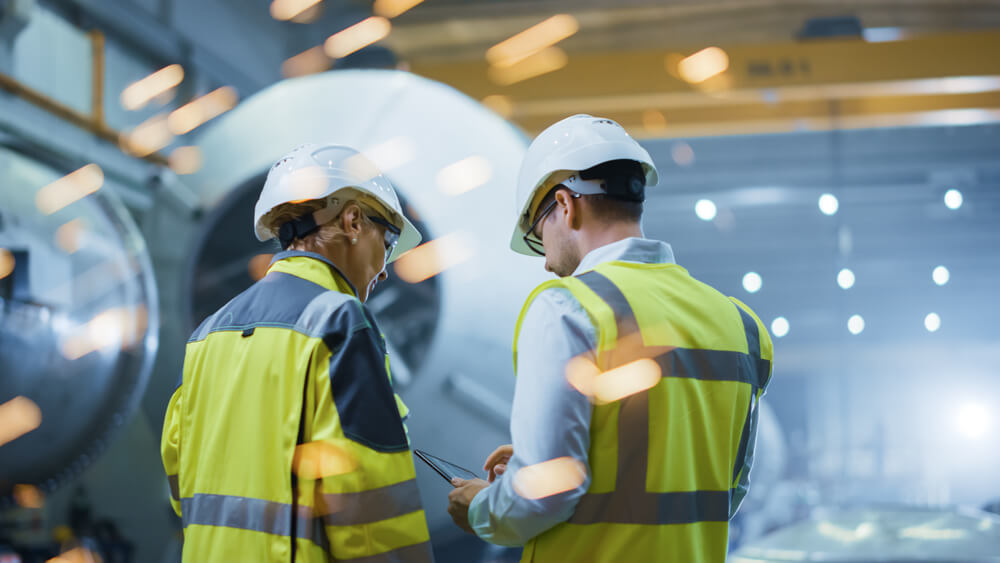New fund to help Enterprise Ireland and IDA Ireland-supported firms to reduce their industrial emissions between now and 2030.
Up to €300m is to be made available to drive the decarbonisation of Ireland’s industrial emissions over the coming years.
Announced today (24 June 2024) by the Minister for Enterprise, Trade and Employment, Peter Burke, TD, the fund will be used by Enterprise Ireland and IDA Ireland to support client companies to reduce their industrial emissions between now and 2030 through the Environmental Aid scheme.
“Industrial emissions account for around 10% of Ireland’s total emissions, so manufacturing businesses have an important leadership role to play in reducing Ireland’s overall carbon emissions”
Minister Burke also published the Decarbonisation of Industrial Heat Roadmap, which sets out what the operating environment for energy used in manufacturing will look like in the future. It identifies the key interventions necessary to decarbonise heat-use in manufacturing sectors, including the supports that are available to companies, forthcoming regulations, and the policies underpinning them.
The future of manufacturing in Ireland is green
“Industrial emissions account for around 10% of Ireland’s total emissions, so manufacturing businesses have an important leadership role to play in reducing Ireland’s overall carbon emissions,” said Minister Burke.
“I’m ringfencing €300m in funding to give these companies certainty that the Government will support them in making these significant investment decisions so that Ireland can achieve our 2030 abatement target. Furthermore, the Roadmap ensures that businesses and Government are working to a shared plan.”
The vast majority of industrial emissions are generated by companies primarily in the food and beverage, cement, pharmaceutical, and chemicals sectors that are supported by Enterprise Ireland and IDA Ireland.
Last month, Diageo announced its plans to reduce the on-site emissions at St. James’s Gate Guinness Brewery, in part supported by Enterprise Ireland. The investment will enable St. James’s Gate to entirely phase out the use of fossil fuels in its direct brewing operations and reduce Scope 1+2 GHG emissions generated by the site by more than 90%, in line with the Science Based Target initiative’s definition of net zero.
“Achieving the targets set out in the Government’s Climate Action Plan for industry of a 35% reduction by 2030 will only be done if every company, large and small, decarbonises,” added the Minister for Trade Promotion, Digital and Company Regulation Dara Calleary, TD.
“While it’s something we all have to do, it should also be seen as an opportunity for businesses to improve their competitiveness.
“Increasingly large companies require their supply chains to meet new sustainability conditions, and in addition, procurement processes also prioritise sustainable companies. Becoming more sustainable can help a business to attract and retain talented staff, as well as meeting the growing customer demand for greener products and services.”
The Environmental Aid scheme is one of a number of Government grants and supports available to companies to help them either start or progress the process of decarbonising their businesses.
“We are all on a journey towards a more sustainable future, and businesses have an important role to play in that by ensuring they are contributing towards our transition to a low carbon economy,” said Enterprise Ireland CEO Leo Clancy.
“It requires a whole of society approach, and supporting Irish-owned businesses on their journey towards a greener future is a key priority for Enterprise Ireland. It is also increasingly important for companies to demonstrate they are taking these steps as there is increased expectations from customers, employees, partners and investors.
“This €300m fund announced today will help companies supported by Enterprise Ireland to take further steps to reduce their emissions. And we also welcome the publication of the Decarbonisation of Industrial Heat Roadmap, as it will support companies as they continue to navigate this journey. The transition to a greener future is no longer just the right thing to do, it is a must do.”
Under the Climate Action Plan, the Government has committed to reducing emissions by 51% across all sectors of the economy by 2030 and to become net zero by 2050. These commitments are enshrined in law under the Climate Action and Low Carbon Development (Amendment) Act 2021.
Michael Lohan, CEO IDA Ireland, said: “Sustainability is a key pillar in IDA Ireland’s strategy, and we have an extensive programme of engagement underway with client companies to remove greenhouse gases (GHG) from their operations.
“Almost all of our top 100 clients have made net zero carbon pledges with many having net zero decarbonisation targets by 2030. IDA Ireland is actively supporting clients to decarbonise their operations through Green Capital support. Since 2022, IDA Ireland client companies have invested over €200m aimed at removing 70,000 tonnes of GHG from their operations.”
“This is very welcome news for Irish manufacturing,” said Conor Magee, head of Manufacturing Sector, Bank of Ireland. As the biggest sector within the Irish economy it is a strategic imperative that manufacturing meets its decarbonising targets for 2030 and 2050.
“More and more businesses recognise the strategic value and competitive advantage of strong green credentials. This funding will accelerate this green transformation across both multinationals and SMEs.”
-
Bank of Ireland is welcoming new customers every day – funding investments, working capital and expansions across multiple sectors. To learn more, click here





